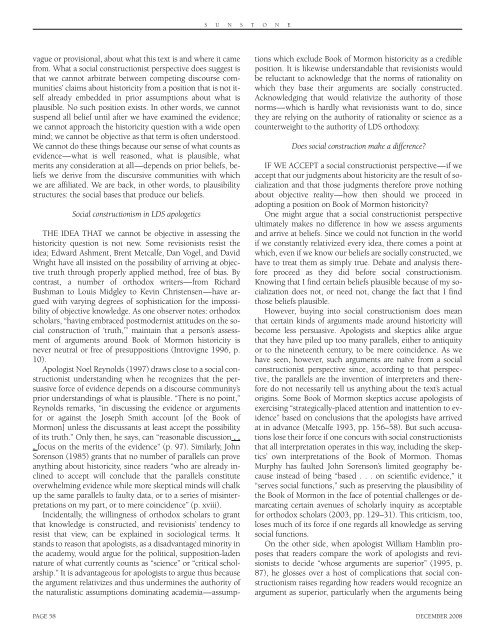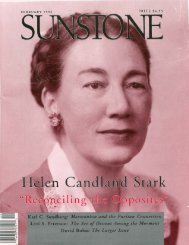Download Entire Issue PDF - Sunstone Magazine
Download Entire Issue PDF - Sunstone Magazine
Download Entire Issue PDF - Sunstone Magazine
You also want an ePaper? Increase the reach of your titles
YUMPU automatically turns print PDFs into web optimized ePapers that Google loves.
S U N S T O N E<br />
vague or provisional, about what this text is and where it came<br />
from. What a social constructionist perspective does suggest is<br />
that we cannot arbitrate between competing discourse communities’<br />
claims about historicity from a position that is not itself<br />
already embedded in prior assumptions about what is<br />
plausible. No such position exists. In other words, we cannot<br />
suspend all belief until after we have examined the evidence;<br />
we cannot approach the historicity question with a wide open<br />
mind; we cannot be objective as that term is often understood.<br />
We cannot do these things because our sense of what counts as<br />
evidence—what is well reasoned, what is plausible, what<br />
merits any consideration at all—depends on prior beliefs, beliefs<br />
we derive from the discursive communities with which<br />
we are affiliated. We are back, in other words, to plausibility<br />
structures: the social bases that produce our beliefs.<br />
Social constructionism in LDS apologetics<br />
THE IDEA THAT we cannot be objective in assessing the<br />
historicity question is not new. Some revisionists resist the<br />
idea; Edward Ashment, Brent Metcalfe, Dan Vogel, and David<br />
Wright have all insisted on the possibility of arriving at objective<br />
truth through properly applied method, free of bias. By<br />
contrast, a number of orthodox writers—from Richard<br />
Bushman to Louis Midgley to Kevin Christensen—have argued<br />
with varying degrees of sophistication for the impossibility<br />
of objective knowledge. As one observer notes: orthodox<br />
scholars, “having embraced postmodernist attitudes on the social<br />
construction of ‘truth,’” maintain that a person’s assessment<br />
of arguments around Book of Mormon historicity is<br />
never neutral or free of presuppositions (Introvigne 1996, p.<br />
10).<br />
Apologist Noel Reynolds (1997) draws close to a social constructionist<br />
understanding when he recognizes that the persuasive<br />
force of evidence depends on a discourse community’s<br />
prior understandings of what is plausible. “There is no point,”<br />
Reynolds remarks, “in discussing the evidence or arguments<br />
for or against the Joseph Smith account [of the Book of<br />
Mormon] unless the discussants at least accept the possibility<br />
of its truth.” Only then, he says, can “reasonable discussion . .<br />
. focus on the merits of the evidence” (p. 97). Similarly, John<br />
Sorenson (1985) grants that no number of parallels can prove<br />
anything about historicity, since readers “who are already inclined<br />
to accept will conclude that the parallels constitute<br />
overwhelming evidence while more skeptical minds will chalk<br />
up the same parallels to faulty data, or to a series of misinterpretations<br />
on my part, or to mere coincidence” (p. xviii).<br />
Incidentally, the willingness of orthodox scholars to grant<br />
that knowledge is constructed, and revisionists’ tendency to<br />
resist that view, can be explained in sociological terms. It<br />
stands to reason that apologists, as a disadvantaged minority in<br />
the academy, would argue for the political, supposition-laden<br />
nature of what currently counts as “science” or “critical scholarship.”<br />
It is advantageous for apologists to argue thus because<br />
the argument relativizes and thus undermines the authority of<br />
the naturalistic assumptions dominating academia—assumptions<br />
which exclude Book of Mormon historicity as a credible<br />
position. It is likewise understandable that revisionists would<br />
be reluctant to acknowledge that the norms of rationality on<br />
which they base their arguments are socially constructed.<br />
Acknowledging that would relativize the authority of those<br />
norms—which is hardly what revisionists want to do, since<br />
they are relying on the authority of rationality or science as a<br />
counterweight to the authority of LDS orthodoxy.<br />
Does social construction make a difference?<br />
IF WE ACCEPT a social constructionist perspective—if we<br />
accept that our judgments about historicity are the result of socialization<br />
and that those judgments therefore prove nothing<br />
about objective reality—how then should we proceed in<br />
adopting a position on Book of Mormon historicity?<br />
One might argue that a social constructionist perspective<br />
ultimately makes no difference in how we assess arguments<br />
and arrive at beliefs. Since we could not function in the world<br />
if we constantly relativized every idea, there comes a point at<br />
which, even if we know our beliefs are socially constructed, we<br />
have to treat them as simply true. Debate and analysis therefore<br />
proceed as they did before social constructionism.<br />
Knowing that I find certain beliefs plausible because of my socialization<br />
does not, or need not, change the fact that I find<br />
those beliefs plausible.<br />
However, buying into social constructionism does mean<br />
that certain kinds of arguments made around historicity will<br />
become less persuasive. Apologists and skeptics alike argue<br />
that they have piled up too many parallels, either to antiquity<br />
or to the nineteenth century, to be mere coincidence. As we<br />
have seen, however, such arguments are naïve from a social<br />
constructionist perspective since, according to that perspective,<br />
the parallels are the invention of interpreters and therefore<br />
do not necessarily tell us anything about the text’s actual<br />
origins. Some Book of Mormon skeptics accuse apologists of<br />
exercising “strategically-placed attention and inattention to evidence”<br />
based on conclusions that the apologists have arrived<br />
at in advance (Metcalfe 1993, pp. 156–58). But such accusations<br />
lose their force if one concurs with social constructionists<br />
that all interpretation operates in this way, including the skeptics’<br />
own interpretations of the Book of Mormon. Thomas<br />
Murphy has faulted John Sorenson’s limited geography because<br />
instead of being “based . . . on scientific evidence,” it<br />
“serves social functions,” such as preserving the plausibility of<br />
the Book of Mormon in the face of potential challenges or demarcating<br />
certain avenues of scholarly inquiry as acceptable<br />
for orthodox scholars (2003, pp. 129–31). This criticism, too,<br />
loses much of its force if one regards all knowledge as serving<br />
social functions.<br />
On the other side, when apologist William Hamblin proposes<br />
that readers compare the work of apologists and revisionists<br />
to decide “whose arguments are superior” (1995, p.<br />
87), he glosses over a host of complications that social constructionism<br />
raises regarding how readers would recognize an<br />
argument as superior, particularly when the arguments being<br />
PAGE 58 DECEMBER 2008

















